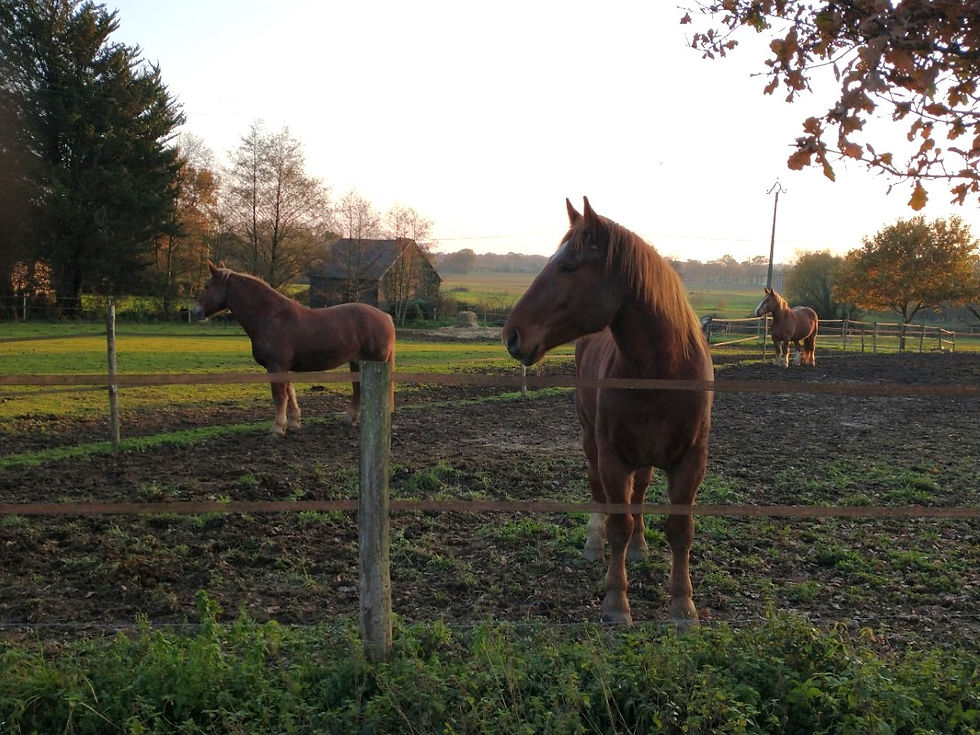Sunday, My Favorite Day in France
- Lori Cronwell
- Jan 25, 2023
- 3 min read
Updated: Feb 16, 2025
It’s Sunday in the French countryside as I write this post. The silence surrounds me, interrupted only by the occasional rooster's crow, the sheep’s baa and the harmonic chime of church bells. All the markets, boulangeries, charcuteries and restaurants in the villages are closed. The dairy cows in the field are the only ones eating out today. In France, Sunday is the day for attending church and long lunches at home with your family.

You’d think a single gal living in rural France would find Sundays difficult. It was frustrating at first. I’d drive to the supermarket in search of necessary items for my evening meal, only to find the market and everything around it closed. I'd roll my eyes, realizing of course, it’s Sunday. Slowly I adjusted, making sure my pantry was well stocked before the weekend. If I absolutely need something on a Sunday in France, there is a small supermarket open from 9 am to 12:45 pm about 20 minutes away.

Sundays in the winter are delightful. Especially if it’s raining. Everyone is inside, cuddled by the fire, and the only sound is the wind rustling through the bare branches of dormant trees. If the sun is out, it’s the perfect time for a walk along the river or through the grounds of a nearby chateau. Folks greet each other with a “bonjour,” as they pass, enjoying their time in nature. And no matter how beautiful the place, there is never a crowd.

In the summer, there are a few places open on Sunday, like the two outdoor restaurants nearby overlooking the river. And there’s at least one Tabac in the area open on Sundays. A Tabac is a café, newspaper stand, bar and more all rolled into one little shop where you’ll wave away cloud of cigarette smoke to enter. But most Tabacs do not serve food, just drinks.
Sundays, especially in summer are the time for festivals and “vide greniers.” A vide grenier is a garage sale, but literally translates to “empty attic.” Vide greniers are not at people’s homes, but in one central location, either indoors or outdoors, where everyone brings their stuff to sell. It looks like a flea market, but you can find a little bit of everything and all at rock-bottom prices. There is always a pop-up bar serving wine and beer for a Euro or two and usually a vender making frites (French fries) and sausages rolled up in a buckwheat crepe, which is a traditional Brittany street food called “galette saucisse.” So you can eat out on a Sunday, just nothing too fancy.
In December, many of the village Christmas markets open on Sunday and sometimes all weekend. Some are inside, but I preferred the outdoor ones. They offer an array of locally made gifts including candles, pottery and honey (it’s a big area for raising bees), as well as crepes, paella and other dishes to enjoy there or take away.
Mostly, Sundays are a day to slow down and just be present. If I’m not getting up early to go to a vide grenier or festival, and I don’t have any social engagements, Sunday becomes my day of freedom. I am free to stay in bed reading as long as I like. I am free to take a long walk by the river or along a country road. Or a long drive in the country and perhaps discover a new village. But if I do, I know I’d better pack a lunch. Sundays are also the perfect day for writing. I embrace the silence and I know my time will not be interrupted.

As the weeks pass in my new home, I begin to appreciate having one day out of the week to slow down and have nothing in particular or of any importance to accomplish that day. I am happy to be with friends or to spend time alone. When I return to the US, I will continue to make Sundays, or at least most Sundays, a day of rest, rejuvination and relaxation.


